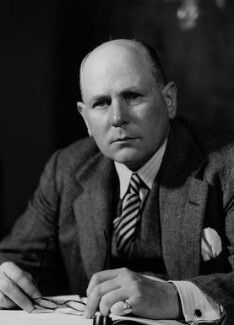James Agate facts for kids
Quick facts for kids
James Evershed Agate
|
|
|---|---|

Agate in 1931
|
|
| Born | 9 September 1877 Pendleton, Greater Manchester, England
|
| Died | 6 June 1947 (aged 69) Holborn, London
|
| Education | Giggleswick School Manchester Grammar School |
| Occupation | Theatre & film critic, writer |
| Spouse(s) |
Sidonie Joséphine Edmée Mourret-Castillon
(m. 1918) |
| Children | 0 |
| Parents |
|
James Evershed Agate (born September 9, 1877 – died June 6, 1947) was a famous English writer. He was known for his diaries and as a theatre critic. Agate wrote about plays and films between the two World Wars.
He started working in journalism in his late twenties. He wrote for The Manchester Guardian from 1907 to 1914. Later, he became a drama critic for The Saturday Review (1921–1923). He also wrote for The Sunday Times (1923–1947) and the BBC (1925–1932).
Agate published nine books of his diaries and letters. These books tell about British theatre during his time. They also cover his interests like sports and his personal life. He wrote three novels and many collections of theatre essays.
Contents
Early Life and Education
James Agate was born in Pendleton, England. This town is near Manchester. He was the oldest child of Charles James Agate and Eulalie Julia Young. His father sold linen and loved music and theatre.
Agate's mother was a skilled pianist. She studied in Paris and Heidelberg. His family had connections with the German art community in Manchester. This meant James was exposed to many performances when he was young. Famous actress Sarah Bernhardt even visited the Agate home in 1912. Agate's sister, May, later studied acting with Bernhardt in Paris.
James went to Giggleswick School and Manchester Grammar School. He was a very good student. Instead of going to university, he worked in his father's business for 17 years.
Starting His Writing Career
In his free time, Agate loved going to the theatre. He admired the writing of George Bernard Shaw. In 1906, he wrote a letter about drama to a local Manchester newspaper. The editor liked his writing and asked him to write a weekly theatre column.
After a year, Agate joined The Manchester Guardian. He worked with other critics under C. E. Montague. Even as a new critic, Agate was not afraid to give bad reviews. He would criticize famous actors if he thought it was fair. For example, he once said that Herbert Beerbohm Tree's acting was "extraordinarily uninteresting."
Agate wrote a play called The After Years when he was in his twenties. It was not very successful. He also tried writing novels, but they were not very important in his career.
Serving in World War I
In May 1915, Agate joined the Royal Army Service Corps. He was 37 years old and was sent to France. He wrote letters about his wartime experiences for The Manchester Guardian. These letters were published in his first book, L. of C. (Lines of Communication).
Agate spoke French well and knew a lot about horses. This helped him get a job buying hay for the army. He wrote about this job in his diaries. His way of keeping track of hay purchases became an official handbook for the War Office.
While serving in France, Agate married Sidonie Joséphine Edmée Mourret-Castillon in 1918. The marriage did not last long. After the war, Agate published another book of essays about theatre called Buzz, Buzz! (1918).
Becoming a London Theatre Critic
After the war, Agate continued his career as a theatre critic. In 1919, he published another book of essays, Alarums and Excursions. In 1921, he got a job at The Saturday Review. This was the same job that George Bernard Shaw once held.
In 1923, Agate moved to The Sunday Times. He stayed there as the theatre critic for the rest of his life. From 1925 to 1932, he also worked as a drama critic for the British Broadcasting Corporation.
The Manchester Guardian later wrote about Agate. They said he understood acting very well. He knew both French and English theatre.
Agate's Diaries and Interests
Besides theatre, Agate also reviewed films for The Tatler. He was a literary critic for The Daily Express. He also had many hobbies. He loved cricket and boxing. He owned Hackney show horses and enjoyed golf.
All these interests are mentioned in his diaries. These diaries were published in a series of books called Ego, Ego 2, Ego 3, and so on. The historian Jacques Barzun praised Agate's diaries. He said they were like Pepys's diary. Barzun noted they were full of vivid characters and historical details. Alistair Cooke also admired Agate and called him the "Supreme Diarist."
Agate had several secretaries. Alan Dent worked for him for 14 years. Agate's diaries are written in a conversational style. They include stories from his day and letters from his readers. He also wrote about his health and money problems.
His diaries often mention his friends, like Herbert Van Thal and George Lyttelton. He also wrote about his brother, Edward Agate. Recurring themes in his diaries included Maria Malibran, Sarah Bernhardt, and Shakespeare. His writing style was strong and honest. It was always entertaining.
Agate also wrote a biography of the French actress Rachel. The novelist Arnold Bennett called it "excited and exciting." Agate's theatre reviews were collected in books like Buzz, Buzz! and First Nights. These books are important for understanding London theatre between the World Wars. His book The English Dramatic Critics, 1660–1932 is also very important.
Later Years
During World War II, Agate's health got worse. He started having heart problems. He died suddenly at his home in London. He was 69 years old. He had just finished writing his ninth Ego diary volume.
 | Tommie Smith |
 | Simone Manuel |
 | Shani Davis |
 | Simone Biles |
 | Alice Coachman |

